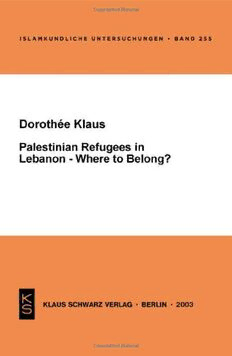
Palestinian Refugees in Lebanon - Where to belong? PDF
Preview Palestinian Refugees in Lebanon - Where to belong?
K S Dorothée Klaus • Palestinian Refugees in Lebanon ISLAMKUNDLICHE UNTERSUCHUNGEN . BAND 255 begründet von Klaus Schwarz herausgegeben von Gerd Winkelhane KLAUS SCHWARZ VERLAG • BERLIN 2003 ISLAMKUNDLICHE UNTERSUCHUNGEN • BAND 255 Dorothée Klaus Palestinian Refugees in Lebanon - Where to Belong? K KLAUS SCHWARZ VERLAG • BERLIN • 2003 S Bibliografische Information Der Deutschen Bibliothek Die Deutsche Bibliothek verzeichnet diese Publikation in der Deutschen Nationalbibliografie; detaillierte bibliografische Daten sind im Internet über http://dnb.ddb.de abrufbar. Alle Rechte vorbehalten. Ohne ausdrückliche Genehmigung des Verlages ist es nicht gestattet, das Werk oder einzelne Teile daraus nachzudrucken oder zu vervielfältigen. © Gerd Winkelhane, Berlin 2003. Klaus Schwarz Verlag GmbH, Postfach 4102 40, D-12112 Berlin ISBN 3-87997-311-3 Druck: Offsetdruckerei Gerhard Weinert GmbH, D-12099 Berlin ISSN 0939-1940 ISBN 3-87997-311-3 Contents Acknowledgements 1 List of Acronyms 3 Palestinian Camps in Lebanon 4 Lebanese Presidents 4 Chronology 5 Introduction 6 Some Theoretical Premises 8 1. Observation-linked Dilemmas and Modes of Self-Integration as a Researcher 1.1. Becoming a Participatory Observer in a Heterogeneous Field 11 1.2. Trust and Transparency 16 1.3. Plots and Conspiracy Theories 18 2. Some Basic Patterns of Lebanese Society 2.1. Unsettled Populations: Palestinian Refugees, Lebanese Migrants, and the Displaced 23 2.2. Continued Fear and Trauma in a Multiconfessional Environment 29 2.3. A Shattered Lebanese State 35 2.4. Reinforcing Patronage and the Honor-Code 42 2.5. Kinship as the Core Affiliative Concept 50 2.6. Conclusion 54 3. Responses to the Palestinian Refugee Influx 3.1. The Flight from Palestine 55 3.2. The Rejection of Resettlement 57 3.3. Syria and Jordan: The Rationale for Integration 60 3.4. The Refugees in Lebanese Demographic Politics 62 4. Palestinians as Strong Players in the Lebanese Arena 4.1. The Camp Refugees Before 1964 73 4.2. The Cairo Agreement: a Landmark in Palestinian-Lebanese Relations 77 4.3. The Benefits of the Cairo Agreement for the Palestinian Refugees 80 4.4. Symbols of Empowerment: The Palestinian Fighters 82 4.5. The New Patrons in the Lebanese Arena 85 4.6. Parallel and Conflicting Developments: The Emancipation of the Palestinians and the Shiites 98 5. Finding Partners in Lebanon Today 5.1. Ideological Umbrellas 113 5.2. Islamic Parties and Congregations: The Muslim Brotherhood, Ahbash, Maqasid, and Hizballah 114 5.3. Discrimination and the Legacy of the Past 121 5.4. Reconnecting with Civil Society 124 6. Coherence and Diversity in the Palestinian Refugee Community 6.1. Palestinian Identities near and within the Camps 129 6.2. The Palestinian Middle Class - Far away from the Camps 133 6.3. Palestinian Society before 1948 135 6.4. Becoming Refugees and Dissolving Former Ties 143 6.5. The Question of Palestinian Return 147 6.6. Between Integration into the Host Country and Loyalty to the National Cause 151 6.7. The Concept of Origin in a Competitive Environment 158 7. Kinship as a Form of Integration 7.1. Who is going to marry whom? 163 7.2. Genealogical Purity, the Ideal Match, and ist Pitfalls 164 7.3. Palestinian-Lebanese Intermarriage: Varying Contexts 168 Epilogue 175 Bibliography 177 Index 201 Acknowledgements I could not have completed this work without the support and contribution of many friends, mentors, and colleagues. Throughout the four years of research and writing, I spent fruitful periods in Bochum, Oxford, Cairo, Beirut, and Berlin. Barbara Harrell-Bond (Oxford) welcomed me at the Refugee Studies Program, Oxford University, to outline and prepare my research under her g uidance. E lisabeth Picard ( Beirut) kindly o pened the d oors of the Centre d'Etudes et de Recherches en Moyen-Orient Contemporain (CERMOC) to me by integrating me into its working group on the Palestinians. Riccardo Bocco (Geneva) and the CERMOC/Amman warmly included me on their research team. Heiner Dürr (Bochum) patiently supervised the development of my thesis. Angelika Neuwirth (Beirut) invited me to stay at the Orient Institute as an associate researcher. Rosemary Sayigh (Beirut) gave me her full attention in discussing the field-research process and generously provided me with materials and information. Gudrun Krämer (Berlin) took time to discuss my work in the context of a workshop on the Lebanon. The Institute for Development Research and Development Policy (IEE) at the Ruhr-Universität Bochum, directed by Wilhelm Löwenstein with an abundance of understanding for the researcher's needs, provided me with all necessary institutional facilities and structural securities. Both the German Research Foundation (DFG) and the German Academic Exchange Service (DAAD) furnished me with fellowships to carry out my research and finish my dissertation. This work could never have been completed without the welcoming generosity of many people in Lebanon who granted me their time and who responded to my questions. I must thank all those who I am unable to name here. I am immensely grateful to those who have shared their friendship with me: Sivine al-Khatib and her cousin Ghada, Bernhard Hillenkamp, Mirella Abdel Sater, Marwan Chebaro, Mäher al-Yamani, Clément Zakhia, Omar Nashabi, Tarek Sinno, Toufic al-Zein, and especially Chaza Charafeddine. l Among the many friends who sustained me through their solicitude I wish to thank Ghaith al-Omari (Oxford), Adel Abdel Moneim and Tamer Kirolos (Cairo), Eva Peters (Hamburg), Ingo Niermann and Antje Majewski (Berlin), Samira Gamal (Sana'a), Raphael Gross (Bochum) and Werner Konitzer (Berlin). I am most grateful of all to my parents, who have enabled me to pursue my studies through their full-hearted support. 2
